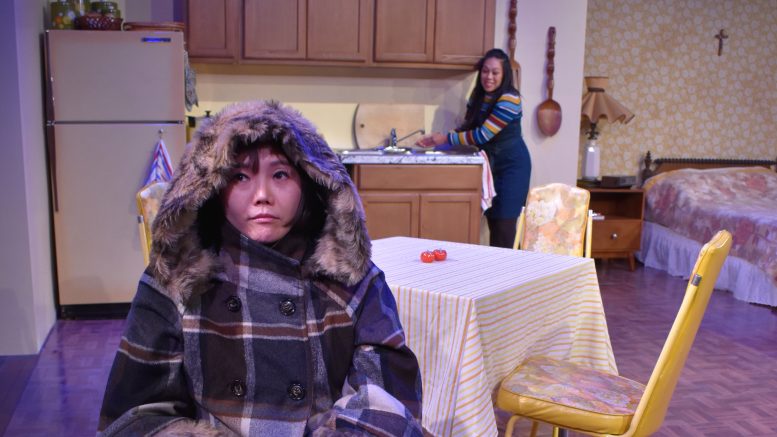By Dave Kempa
The two women could not enter the barren, yellow-wallpapered apartment in more starkly different manners.
Luna launches in as if from the barrel of a cannon, rattling off each thought that rises as she welcomes a potential friend into her modest apartment for the first time during her three months in the US. Jane — timid and meek — scarcely manages a word as she builds the courage to cross the threshold into Luna’s home.
They are so clearly different, yet also similar. Wearing the exact same Kmart coats, these two young immigrants met at the grocery store while shopping alone, their physician husbands both working through the night on this lonesome Thanksgiving.
What luck to have found one another.
The single-act, two-player production of “The Heart Sellers” at Capitol Stage is playwright Lloyd Suh’s nuanced, human examination of the solitude and uncertainty that underscored life for young immigrants hailing from Asia to Nixon-era USA.
If not for the Hart-Celler Act, Luna and Jane would have never met. Signed by President Lyndon B. Johnson in 1965, this bill opened immigration to people in nations all over the world after decades of policy that was, to put it bluntly, patently racist. In the years before, 70% of all immigrants came from just three countries — all in western Europe.
Luna (played with a frenetic joie de vivre by Nicole Javier) is Filipina, and Jane (captured with wonderful nuance by Wonjung Kim) is Korean. They’ve just brought home a turkey for the holiday and are working out how to cook it as each one feels out her potential new friend.
Luna shows a strong grasp of English, likely tied to the US’s half-century colonization of the Philippines, as she makes a sorry spread of snacks — Ritz crackers, Easy Cheese and Cheetos — for her guest. She asks Jane, clearly struggling with this new language, if she knows how to prepare a turkey.
Jane: Yes.
Luna: Wait really you do?
Jane: Yes, I do yes.
Luna: You know how to cook Thanksgiving turkey?
Jane: Mm. Because Julia Child.
Suh’s script is dynamic, first charging forward, now popping, crackling. It cools to a simmer, then stops all together. The verbal tics and grammatical nuances of first-generation Filipino and Korean-Americans are a joy to behold in the actresses’ deft delivery.
As with any two-handed production, chemistry is key for the duo. In this regard, director Jennifer Chang rightly demands much of Nicole Javier and Wonjung Kim — and the two deliver in countless, wonderful ways that evolve alongside their characters’ budding friendship.
Once Luna pops open a bottle of cheap wine and pours some into two absurd, farm-themed mugs, the two seemingly different 23-year-olds find that they relate to one another in more ways than one: how badly they miss their families; the political turmoil in each of their home countries. Did they marry their husbands because they love them? Did the fact that they’re doctors with career potential play a role? Did they give them their hearts, or …
Though their husbands both drink (a revelation that hangs in the air, ever so briefly), the two agree that a good wife should not. And the more they drink, the more they revel in their daring misdeed. Suddenly, they wonder what else they can do that they should not. Bowling? Dancing?! If they called a cab, where would the night take these young mischievous women?
The apartment’s drab yellow wallpaper strikes as a brilliant choice for the set, evoking Charlotte Perkins Gilman’s “The Yellow Wallpaper”; this late 19th century short story, conveyed through a young woman’s journal entries, tells the story of her physician husband renting a mansion and then sequestering her to a single room — decorated with yellow wallpaper — after he diagnoses her with “temporary nervous depression.” Isolated with no company but her own thoughts, she descends into madness.
In this strange new nation marked with foreboding political uncertainty — their husbands working around the clock — Luna and Jane have potential to serve as one another’s lifeline.
This production of “The Heart Sellers” is taking a victory lap through Northern California for good reason. It delivers with incredible acting and a meaty, layered dialogue, with maybe two or three lulls that leave the viewer’s mind to wander if they’re not careful.
One wonders how a story like this ends, wherein much of the tension is simply the question of if Luna and Jane’s friendship will endure (which isn’t much of a dramatic hook). Frankly, I wasn’t ready for how it did. I wanted more. But that’s also because I was so rapt with the characters, their uncertain station in the world, and how thankful they were to have found someone to share the holiday with.
This story was funded by the City of Sacramento’s Arts and Creative Economy Journalism Grant to Solving Sacramento. Following our journalism code of ethics and protocols, the city had no editorial influence over this story and no city official reviewed this story before it was published. Our partners include California Groundbreakers, Capital Public Radio, Outword, Russian America Media, Sacramento Business Journal, Sacramento News & Review, Sacramento Observer and Univision 19. Sign up for our “Sac Art Pulse” newsletter here.


Be the first to comment on "‘The Heart Sellers’ explores solitude, uncertainty and the glimmers of possibility for Nixon-era immigrants"